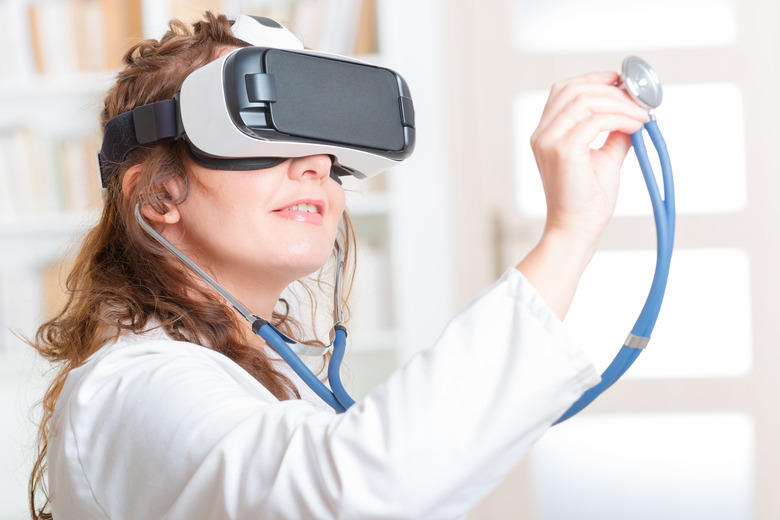What Is The Importance Of Virtual Reality To Doctors And Surgeons?
Virtual and augmented reality programs just got admitted to hospitals across the U.S. – and not because the software is sick or dying. Doctors, surgeons and hospitals have eagerly embraced the potential of virtual reality, augmented reality and their related technologies. Doctors and surgeons at Stanford Medicine now use virtual reality software programs combined with MRIs, angiograms and CT scans to treat patients and plan surgeries in advance. With virtual reality, even patients can visualize the planned treatment ahead of time to help ease their minds.
TL;DR (Too Long; Didn't Read)
VR and AR software programs are important to the healthcare industry because:
* **Hospitals** **use it to teach** new doctors, nurses and surgeons.
* **Doctors** **learn complex procedures** using computer equipment.
* **Surgeons can map out complicated surgeries** in advance.
* **Patients experience the medical procedure** from the doctor's point of
view.
* The software provides means to **calm and relax patients without drugs**.
* Psychiatrists and psychologists use it to **treat anxiety disorders**.
Hospitals and Virtual Reality
Hospitals and Virtual Reality
Dr. Ajit Sachdeva, director of education with the American College of Surgeons, recently told reporters for NBC News that "VR has reached a tipping point in medicine," especially since it can incorporate X-rays, MRIs, CT and other scans in less than a minute. In emergency room situations, this can sometimes mean the difference between life and death. Hospitals across the U.S. now use virtual reality in all areas of healthcare.
Patient Treatment
Patient Treatment
Even for minimally invasive treatments, VR headsets and programs can calm and relax patients who cannot use anesthesia or other drugs to control pain. While still in its infancy as a substitute for drugs in this way, NBC News reports the results are successful so far. The technology may be especially helpful for brain surgery because it lets surgeons complete a dry run first, allowing them to choose the best equipment for the actual operation. The software also gives surgeons and doctors the ability to choose the best surgical options and helps to minimize surprises. One doctor ran through the software program first before separating conjoined twins. It helped him see the complications that could arise in advance of the actual surgery.
Patient Participation
Patient Participation
By putting on a VR headset with the loaded scans and images, patients can get a preview of the surgery the doctor wants to perform to help them better understand the process. But this isn't the only way that patients use medical VR. Psychiatrists and psychologists also use VR to help treat patients with bipolar disorders, Post-Traumatic Stress Disorder, rehabilitation after a stroke and much more. The simulations put people into stressful situations so that doctors can teach them to recognize when these occur and teach them how to cope with them. These simulations help cancer patients treat pain and anxiety and gives them tools for self-management. When paired with an experimental robotic bodysuit and repeated training, it has also helped paraplegic subjects in a study regain muscle control.
The Future of Virtual Medicine
The Future of Virtual Medicine
Right now, teaching hospitals use virtual reality to train doctors and teach surgeons, help patients to mitigate pain and anxiety, and learn new coping mechanisms. Doctors and patients can work through surgeries or other medical treatments together before they occur so that the patient gains confidence in the procedure. Though in its infancy, experts say that VR and augmented-reality healthcare treatment is and will continue to change the face of healthcare for years to come by adding new jobs that don't exist as of today and opening new avenues of exploration and medical treatment for the human body. These software programs continue to create innovations in the teaching environment, reduce the high costs associated with training and provide new opportunities for doctors and patients to learn through actualization and simulation.
References
- Stanford Medicine: Virtual Reality System Helps Surgeons, Reassures Patients
- NBC News: 3 Ways Virtual Realty Is Transforming Medical Care
- Virtual Reality Today Magazine: Top 10 Incredible Uses of Medical Virtual Reality
- EDUCAUSE Review: VR and AR: Driving a Revolution in Medical Education & Patient Care
Cite This Article
MLA
Brenner, Laurie. "What Is The Importance Of Virtual Reality To Doctors And Surgeons?" sciencing.com, https://www.sciencing.com/what-is-the-importance-of-virtual-reality-to-doctors-and-surgeons-13710347/. 23 March 2018.
APA
Brenner, Laurie. (2018, March 23). What Is The Importance Of Virtual Reality To Doctors And Surgeons?. sciencing.com. Retrieved from https://www.sciencing.com/what-is-the-importance-of-virtual-reality-to-doctors-and-surgeons-13710347/
Chicago
Brenner, Laurie. What Is The Importance Of Virtual Reality To Doctors And Surgeons? last modified March 24, 2022. https://www.sciencing.com/what-is-the-importance-of-virtual-reality-to-doctors-and-surgeons-13710347/
